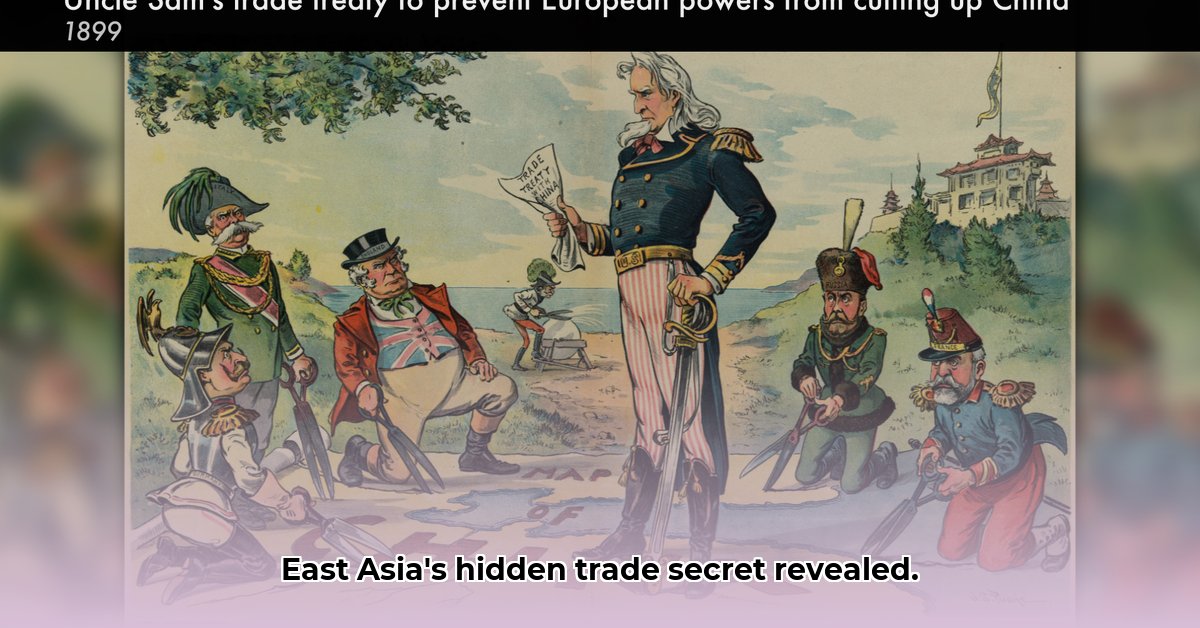The Open Door Notes, a series of US policy statements issued between 1899 and 1900, ostensibly championed equal trading access to China for all nations. However, this seemingly benevolent policy operated within a complex web of existing unequal treaties and spheres of influence, raising questions about its true impact and motivations. Did the Open Door policy genuinely foster equality, or did it serve to mask a deeper agenda of American self-interest? This article delves into the intricate history of this pivotal period, examining the policy’s ramifications for East Asia, identifying its winners and losers, and analyzing its complex and often contradictory legacy.
A Promise of Equality or a Veil for Self-Interest?
The Open Door Notes advocated for free and open trade within China, presenting a narrative of fairness and international cooperation. This rhetoric, however, clashed starkly with the reality on the ground. While presented as a safeguard for Chinese sovereignty, the policy failed to dismantle the existing framework of unequal treaties. Instead, it arguably reinforced these imbalances, creating a system where foreign powers could continue to exert significant economic and political influence. The US, a vocal proponent of open markets, simultaneously maintained exclusionary immigration policies targeting Chinese laborers. This glaring contradiction exposed a fundamental hypocrisy at the heart of the Open Door policy, raising questions about the sincerity of its stated goals. Were the notes genuinely intended to promote equality, or were they primarily a tool to advance American economic and political ambitions in the region?
Unequal Treaties: The Cracked Foundation of Open Trade
The Open Door policy emerged within a context already shaped by a series of unequal treaties imposed upon China, most notably following the Opium Wars. These treaties had significantly eroded Chinese sovereignty, granting foreign powers extensive concessions and control over key ports and trade routes. Rather than rectifying these pre-existing inequalities, the Open Door Notes largely operated within their confines. The policy failed to address the existing privileges enjoyed by foreign powers, effectively legitimizing and perpetuating the very system it purported to challenge. This failure to address the root causes of unequal trade undermined the policy’s effectiveness and further solidified China’s subordinate position in the global economic order. Like attempting to build a stable structure on a cracked foundation, the Open Door policy was inherently flawed from its inception.
Winners and Losers: A Complex Calculus of Power
The impact of the Open Door policy on various stakeholders was far from uniform. The US, while undoubtedly gaining increased access to Chinese markets, simultaneously reinforced discriminatory practices against Chinese immigrants. This duality reveals the inherent self-interest driving American policy. European powers, initially beneficiaries of established spheres of influence, faced increasing competition from both the US and a rapidly modernizing Japan. Japan, in particular, proved adept at exploiting the ambiguities and weaknesses of the Open Door policy to expand its own imperial ambitions in East Asia, culminating in the invasion of Manchuria in 1931. And China? Arguably the biggest loser, the policy further undermined its sovereignty, facilitating continued economic exploitation and contributing to political instability. The Open Door policy, therefore, presents a complex calculus of power, where perceived benefits and losses are intricately intertwined with the broader geopolitical landscape of the era.
The Legacy: A Cautionary Tale of Idealism and Realpolitik
The Open Door policy’s lasting legacy is one of unfulfilled promises and unintended consequences. While framed in the language of equal opportunity and free trade, the policy ultimately failed to achieve these lofty goals. Its inability to address pre-existing inequalities, coupled with the self-serving motivations of the major powers involved, contributed to escalating tensions and further exploitation of China. The Open Door policy serves as a cautionary tale about the complexities of international relations, highlighting the challenges of balancing idealistic principles with the realities of power politics and the enduring impact of historical injustices. The ramifications of this policy continue to shape the geopolitical landscape of East Asia to this day.
- Revolution Space: Disruptive Ion Propulsion Transforming Satellites - April 24, 2025
- Race Through Space: Fun Family Game for Kids - April 24, 2025
- Unlocking the Universe: reading about stars 6th grade Guide - April 24, 2025


![Excavating the Ancient Marvel: A Historical Study of [Important Port City in Ancient India] important-port-city-in-ancient-india_2](https://www.lolaapp.com/wp-content/uploads/2024/01/important-port-city-in-ancient-india_2-150x150.jpg)













